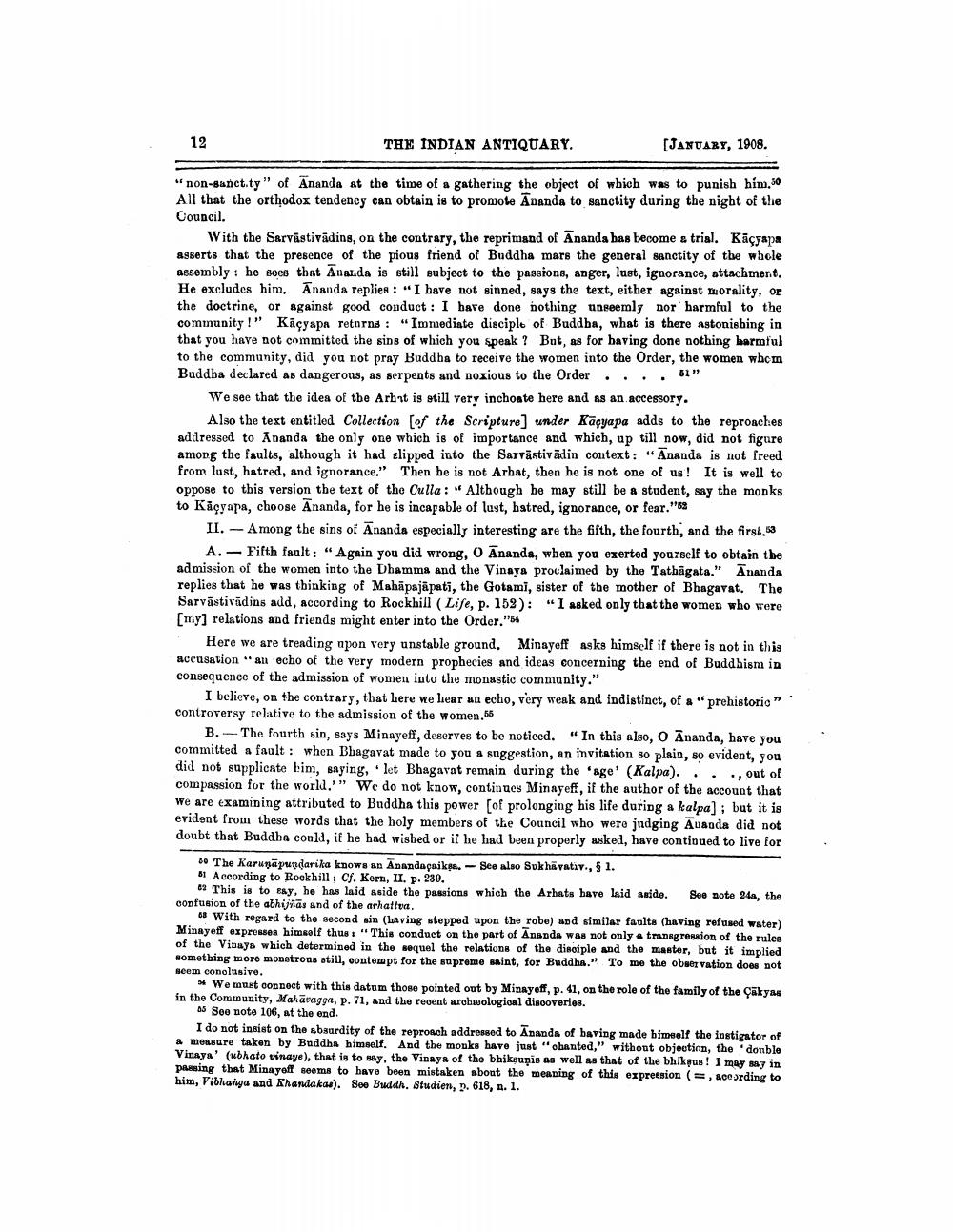________________
12
THE INDIAN ANTIQUARY.
(JANUARY, 1908.
"non-sanct.ty" of Ananda at the time of a gathering the object of which was to punish him. 50 All that the orthodox tendency can obtain is to promote Ananda to sanctity during the night of the Council.
With the Servästivādins, on the contrary, the reprimand of Ananda has become a trial. Kāçyapa asserts that the presence of the pious friend of Buddha mars the general sanctity of the whole assembly : he sees that Anada is still subject to the passions, anger, lust, ignorance, attachment. He excludes him. Ananda replies: "I have not sinned, says the text, either against morality, or the doctrine, or against good conduct: I have done nothing tingeemly nor harmful to the community!" Kāçyapr returns : "Immediate disciple of Buddha, what is there astonishing in that you have not committed the sins of which you speak? But, as for baving done nothing harmful to the community, did you not pray Buddha to receive the women into the Order, the women whom Buddha declared as dangerons, as serpents and noxious to the Order .... 01"
We see that the idea of the Arhat is still very inchoate here and as an accessory.
Also the text entitled Collection (of the Scripture] under Kaçyapa adds to the reproaches addressed to Ananda the only one which is of importance and which, up till now, did not figure among the faults, although it had clipped into the Sarvästivādin context: "Ananda is not freed from lust, hatred, and ignorance." Then he is not Arhat, then he is not one of us! It is well to oppose to this version the text of the Culla: "Although he may still be a student, say the monks to Kagyapa, choose Ananda, for he is incapable of lust, hatred, ignorance, or fear."
II. - Among the sins of Ananda especially interesting are the fifth, the fourth, and the first 53
A. - Fifth fault: "Again you did wrong, 0 Anands, when you exerted yourself to obtain the admission of the women into the Dhamma and the Vinaya proclaimed by the Tathāgata." Ananda replies that he was thinking of Mahāpajāpati, the Gotami, sister of the mother of Bhagavat. The Sarvästivīdins add, according to Rockhill (Life, p. 159): "I asked only that the women who were [my] relations and friends might enter into the Order."54
Here we are treading upon very unstable ground. Minayoff asks himself if there is not in this accusation an echo of the very modern prophecies and ideas concerning the end of Buddhism in consequence of the admission of women into the monastic community."
I believe, on the contrary, that here we hear an echo, very weak and indistinct, of "prehistoria" controversy relative to the admission of the women.56
B.-The fourth sin, says Minayeff, deserves to be noticed." In this also, O Ananda, have you committed a fault : when Bhagavat made to you a suggestion, an invitation so plsin, so evident, you did not supplicate him, saying, let Bhagavat remain during the 'age' (Kalpa)...., out of compassion for the world."" We do not know, continues Minayeff, if the author of the account that We are examining attributed to Buddha this power [of prolonging his life during a kalpa]but it is evident from these words that the holy members of the Council who were judging Ausoda did not doubt that Buddha could, if he had wished or if he had been properly asked, have continued to live for
00 The Karunāpundarika knows an Anandaçaiks. - See also Sukhavatav., $1. 81 According to Rookhill; cf. Kern, II. p. 239.
12 This is to say, he has laid aside the passions which the Arhats have laid aside. See note 94a, the confusion of the abhimas and of the arhattua.
* With regard to the second sin (having stepped upon the robe) and similar faults (having refused water) Minayeff expresses himself thus "This conduct on the part of Ananda was not only a transgression of the rules of the Vibaya which determined in the sequel the relations of the disciple and the master, but it implied something more monstrous still, oontempt for the supreme saint, for Buddha." To me the observation does not seem conolusive.
# We must connect with this datum those pointed out by Minayoff, p. 41, on the role of the family of the çikyas in the Community, Mahāraggr, p. 71, and the recent arobsoologioal discoveries.
05 Soo noto 106, at the end.
I do not insist on the absurdity of the reproach addressed to Apands of having made bimself the instigator of & measure taken by Buddha himself. And the monks have just "chanted," without objection, the 'donble Vinaya' (ubhato vinaye), that is to say, the Vinaya of the bhiksuņis as well as that of the bhikpas ! I may my in passing that Minayoff seems to have been mistaken about the meaning of this expression (=, ace srding to him, Vibhanga and Khandakas). See Buddh. Studien, 9. 618, n. 1.




